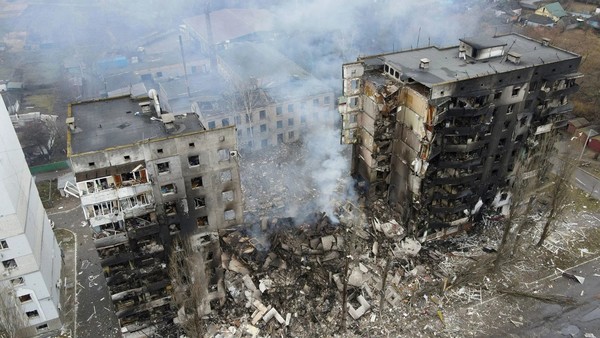One Year into the Russia-Ukraine War:
More than a year has passed since the commencement of war in Ukraine, with no clear victory in the foreseeable future. Meanwhile, millions have been displaced from their homes, spurring a massive humanitarian crisis. In this Spotlight, we review the development of the war from our view 13 months in and its implications in both a humanitarian and political context.

On February 24, 2022, Russian President Vladimir Putin ordered the country’s military forces into Ukrainian territory under what he termed a “special military operation”. He expected a swift “reclamation” of land and, by unifying both countries, to engrave his name into the list of the Russian Federation's greatest leaders. Unforeseen by Putin himself, however, were months of never-ending warfare that his endeavor into Ukrainian territory caused. A year later, the conflict still has not been resolved; if anything, it has been aggravated.
History between Russia and Ukraine dates back to the late 9th century, with the first East Slavic state, Kievan Rus’, being the cultural ancestor of the two countries. Ukraine has had a long history of being colonized and fighting for independence. After the dissolution of the Union of Soviet Socialist Republics in December 1991, Ukraine declared independence from Soviet control and has sustained itself as a sovereign state, transitioning from being run by a communist-backed party to developing its own democratic government. Russia was, and still is, strongly opposed to Ukrainian independence due to the shared ancestorship denoting that Russians and Ukrainians are one people, which eventually resulted in the annexation of Crimea in 2014 and sparked the Russian invasion of Ukraine in 2022.
There are numerous speculations on why Putin wants Ukraine to reunite with Russia. Firstly, Putin may think that Ukraine is part of Russian territory due to it being a post-Slavic country. Secondly, Putin may believe that capturing Ukraine would prove that communism prevails over capitalism, as stated by Emily Harding, former analyst at the United States Central Intelligence Agency. Thirdly, Putin stated that he wants to “protect people who have been subjected to bullying and genocide for the last eight years”, alluding to the Crimean annexation; “strive for the demilitarization and denazification of Ukraine”, implying the dire need of a reform led by Russia for the allegedly uncivilized, independent Ukraine; and “bring to court those who committed numerous bloody crimes against civilians”, addressing Putin’s accusation of the “genocide” of Russian speakers in Ukrainian territory. The Russian president is therefore determined to recover what he considers the “lost land”, even if it means he has to take it back by force, as this war demonstrates.
Looking at the implications that the war has brought, the invasion of Ukraine remains unjustified. Although Putin claims that a reunification will bring positive changes to both Ukraine and Russia, many criticize the president for acting upon his personal interests. According to Eliot A. Cohen, the Arleigh A. Burke Chair in Strategy of the Center for Strategic and International Studies, Putin is interested in reconstructing the Russian Empire. However, this comes at the expense of an immense humanitarian crisis. Russian bombings have caused severe infrastructural damage in major Ukrainian cities, including Kyiv and Zaporizhzhia. Since the invasion began last year, nearly 6 million Ukrainians have been internally displaced, 8 million more sought refuge in neighboring countries, and a total of 17.6 million require humanitarian aid, as reported by the United Nations High Commissioner for Refugees. More than 8,000 citizens have been reportedly killed, with the actual number of deaths likely being significantly higher. Studies revealed that the war has left Ukrainian youth with psychological disorders including post-traumatic stress disorder, anxiety, and depression. Russia has not had it easy either, with over 200,000 recorded casualties in total to date. Russian citizens have also expressed silent dissent toward the continuation of war by leaving written messages all over the country — on walls, guideposts, pipes, and any other surface they could find.
The impacts of the war are observed not only within Ukraine, but also in Europe, and even extends across the oceans to other continents. The ongoing conflict has created obstructions in global trade and resulted in price increases for food and other necessities. This has also amplified the food shortage crisis in Ukraine and other parts of the world, including countries heavily reliant on Ukrainian grain exports and experiencing food insecurity, such as those in the Horn of Africa. Furthermore, Russia, the second largest supplier of natural gas, has cut down its energy supply to other European countries. As gas prices soared in the past year, countries had to experience a cold, harsh winter with insufficient gas to keep their citizens warm. Even after implementing new policies and switching to different suppliers to overcome the crisis, the disruption of the Russian energy supply has negatively affected the European economy, and there is no telling how or when it will return to its former standing.
Putin’s decision to set foot into Ukrainian territory can easily be seen as one of history’s worst slip-ups, seeing how there is no end in sight for the ongoing war. The Russian president’s miscalculated actions have led to a year-long humanitarian crisis in Europe and threatened the world’s economic stability which, if left unaddressed, will continue exacerbating the situation. Only when Putin acknowledges Ukraine as an independent nation with entitled rights of sovereignty will the world witness the beginning of a resolution to the conflict.

